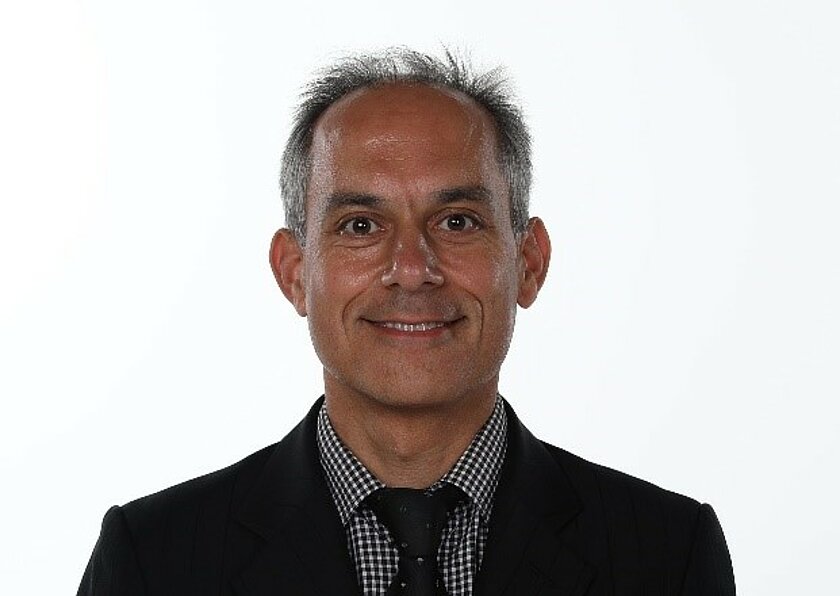The dialogue partners
Patrick Da-Cruz is Professor of Business Administration and Healthcare Management at the Faculty of Healthcare Management at Neu-Ulm University of Applied Sciences (HNU) and Academic Director of the MBA programme Leadership and Management in Healthcare.
Before joining the HNU, Mr Da-Cruz worked for well-known strategy consultancies in the pharmaceutical/healthcare sector and in management positions in companies in the healthcare industry in Germany and abroad.

Roger Jaeckel is an honorary professor at the Faculty of Healthcare Management and has held a management position in the healthcare industry since 2004, specialising in healthcare policy, market and patient access. He is also Chairman of the Advisory Board of the HNU in the MBA programme Leadership and Management in Healthcare. He is the author of numerous publications and publications on health policy and healthcare, including co-editor of two specialist books on "Market Access in Healthcare". Roger Jaeckel has been a senior consultant at the Ulm-based consultancy bcmed since 2023.

Prof Jaeckel, everyone is talking about the hospital reform. What role does the so-called Hospital Transparency Act, which was recently discussed in the mediation committee of the Bundestag and Bundesrat, play in this context?
Prof Roger Jaeckel: The Hospital Transparency Act can be described as a preliminary stage to the actual hospital reform. Initially, it was conceived as a workaround strategy by Federal Health Minister Lauterbach to enforce the negotiating points in the hospital reform that could not be enforced against the federal states under the aspect of quality assurance. In particular, the allocation of hospitals according to care levels is nevertheless included in this transparency law without the support of the federal states, which has clearly clouded the willingness to compromise on a jointly supported hospital reform. The result of this law, which does not require approval in the Bundesrat, was initially a majority rejection of the law by the federal states.
As a result, the Mediation Committee met on 21 February 2024 after a considerable delay and recommended to the Bundesrat by a majority that this law, which had already been passed by the Bundestag on 19 October 2023, be adopted without amendment. As a result, the majority on the part of the federal states has since changed in favour of Lauterbach's chosen reform strategy. Although the formal decision by the Bundesrat will not be made until 22 March 2024, it can be considered certain that nothing will change in this recommended decision. This means it is initially 1:0 in favour of Karl Lauterbach.
The Hospital Transparency Act ostensibly creates the technical data requirements for categorising hospitals according to service groups. With this kind of "preliminary law", it is therefore only possible to get a major hospital reform off the ground at all.
How should the result agreed by a majority in the mediation committee be interpreted politically?
Prof Roger Jaeckel: We can definitely state that the phalanx of the federal states, which was still very impressive at the beginning of the first rounds of negotiations on the hospital reform, has now collapsed like a house of cards. On the one hand, the party seasonality in the federal states obviously takes precedence over the interests of the hospitals in their own states, coupled with the fact that the CDU-governed states do not have a majority in the Bundesrat. Furthermore, the SPD-governed states also wanted to send out a party-political signal that they would not leave their own health minister out in the cold.
Minister Lauterbach achieved the greatest effect with a protocol declaration that was submitted to the mediation committee before the start of the meeting and contained, among other things, the offer of a transformation fund and, according to reports, a financial volume of 50 billion euros, spread over ten years, to be financed equally by the federal government and the federal states. This makes it clear that the financial interests of the federal states take precedence over the preservation of their own planning competences. The transformation fund on this scale is likely to be the reform policy game changer to finally get the large-scale hospital reform off the ground. According to statements by Minister Lauterbach, this reform law should also be recognised as not requiring approval.
Is the transformation fund proposed by Federal Health Minister Lauterbach really the solution to all financing problems in the hospital sector?
Prof Roger Jaeckel: It is impossible to give a serious answer today as to whether this will have a real "knock-on effect". Firstly, it is a political idea that still needs to be translated into real political action. This is likely to be the case with the announced major hospital reform at the end of April 2024. However, a fund of this size also has its pitfalls. On the one hand, it will create a huge funding bureaucracy that will have to be managed by the hospitals in addition to the existing Hospital Structure Fund, the Hospital Future Fund and other state-specific funding programmes. On the other hand, it is still completely unclear which types of funding actually fall under this transformation fund. At present, one has the impression that dual hospital financing no longer exists in reality and that any financial bottleneck can be met with the future money. Of course, this is certainly not the case. In my opinion, only investment measures that become necessary in the course of the hospital reform can be taken into consideration. Furthermore, the eligibility of hospitals for funding will largely depend on the budget of the individual federal states and whether they are willing to contribute half of their funding.
The EUR 50 billion mentioned is therefore a maximum funding amount, which in reality is likely to be significantly lower if one considers the financial scope of the federal states from today's perspective. The funding bureaucracy that still needs to be set up also means that funding measures applied for are not realised in a timely manner or are associated with a great deal of time and personnel expenditure. The planned funding logic of distributing 50 billion euros on a linear basis over 10 years should also be questioned at this point. In any case, the operating deficits that hospitals are already accumulating today will not experience any financial improvement with this transformation fund that will be set up in the future.
What does this transparency law actually mean for hospitals?
Prof Roger Jaeckel: Firstly, the obligation to report the requested structural data to the InEK (Institute for the Hospital Remuneration System) on a regular basis, i.e. quarterly, although due to the time delay that has occurred, it is not clear when these reports must be submitted to the InEK for the first time. Legal clarification is still required here. This additional documentation effort should not be underestimated. Furthermore, service groups and care levels are effectively being introduced through the back door before hospital planning measures have already been decided at state level. As a result, this does not lead to the much-cited political demand for improved service transparency. In any case, the majority of the federal states have spoken out in favour of this approach without having consistently considered the consequences for hospital planning in their own federal state. The Hospital Transparency Act is only the prelude to the large-scale hospital reform, which will extend over a longer period of time. The planned ten-year term of the transformation fund underpins this assumption very impressively. There will be some liquidity improvements in operating cost financing, but these will not bring about a timely financial improvement for all hospitals.
Final question: Will the major hospital reform still succeed this year or what exactly do we need to prepare for?
Prof Roger Jaeckel: Based on the current political climate, it looks like Minister Lauterbach will achieve a breakthrough and that this reform can still be passed this year by hook or by crook and with the support of the SPD-led federal states. However, it will be at least two legislative periods before this hospital reform is properly implemented and the current Minister of Health will be history by then. This means that the hospital reform, which is still to be finalised in 2024, is likely to undergo a number of changes and adjustments during the implementation process, as the lack of internal logic in this hospital reform is a poor guarantee. The federal and state governments bear equal responsibility here. Primarily, the feasibility of this reform should have been clarified locally. This is where I see the greatest difficulties in consolidating hospital services. The shortage of skilled labour in the healthcare sector on the one hand and the demographic change that has been apparent for years on the other play almost no role in this reform approach. The consequence of this is that the hospital sector will retain its status as a "major health policy reform site" in the coming years. The party programmes for the next general election will be able to provide information on this in the near future.
Many thanks for the interview!






